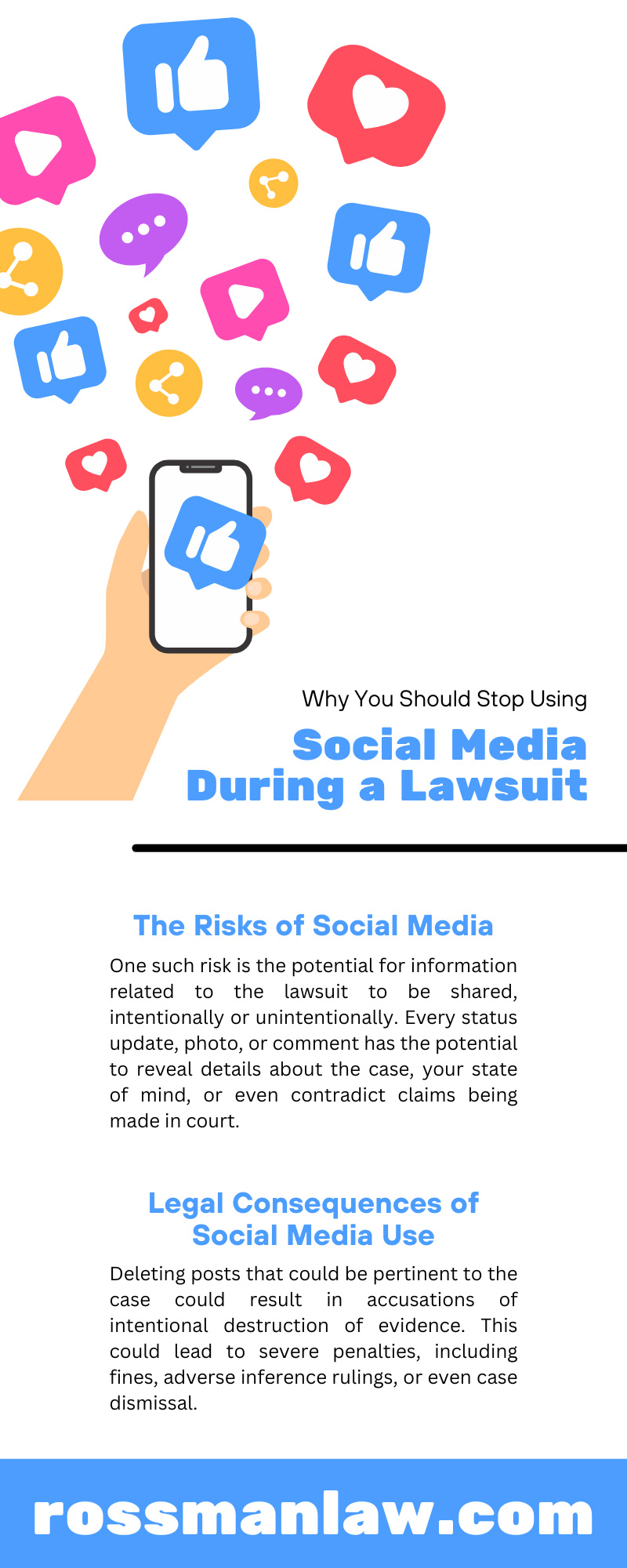
Shocking Medical Malpractice Statistics in the USA
February 9, 2024
5 Rights You Have as a Patient in a Hospital
February 21, 2024In a world where online interactions dominate our daily lives, the implications of each digital footprint we leave behind are of growing importance. This is particularly true when you find yourself embroiled in legal proceedings. Your social media activity, whether you are an avid user or an occasional browser, could significantly influence the outcome of your lawsuit.
Let’s explore the reasons why you should pause your social media use during a lawsuit. Posts that may seem innocent at first glance can quickly morph into substantial pieces of evidence. Understanding the potential effects of your online behavior on your legal proceedings is crucial to protecting your interests.
The Impact of Social Media on Lawsuits
In the realm of lawsuits, social media has emerged as a powerful tool that can have a profound impact on the proceedings and their outcomes. When you post on social media platforms, you are essentially publishing information that is potentially accessible to anyone, including legal professionals involved in your case.
Attorneys have become adept at scouring these platforms for evidence that can support their arguments. A seemingly innocuous photograph or status update can provide insights into your lifestyle, behavior, or state of mind, which could either corroborate or contradict the claims being made in court. For instance, a photo from a recent holiday might be used to challenge claims of financial distress, or a status update about a physical activity could undermine claims of physical injury.
Moreover, the comments and interactions on your posts can also serve as valuable sources of information. They can reveal details about your relationships, activities, and even locations, which may be pertinent to the lawsuit. Even if you have stringent privacy settings, there is always a risk that this information can make its way to the opposing counsel.
Another critical aspect to consider is the permanence of social media posts. Despite popular belief, deleting a post does not necessarily mean it disappears forever. Digital forensics can often recover deleted content, and screenshots can preserve posts even after they are removed. An ill-considered post made in haste can continue to affect your lawsuit long after you have attempted to erase it.
The Risks of Social Media
When you find yourself in the midst of a lawsuit, using social media can present a variety of risks. One such risk is the potential for information related to the lawsuit to be shared, intentionally or unintentionally. Every status update, photo, or comment has the potential to reveal details about the case, your state of mind, or even contradict claims being made in court. Even seemingly harmless posts can be interpreted in ways you did not intend, providing ammunition for the opposing counsel. The danger lies not just in what you post, but also in what others post about you and the interactions you have with others. Every digital interaction holds the potential to be scrutinized and possibly used against you.
Despite the perceived protection offered by privacy settings, they do not guarantee complete confidentiality. It is important to note that “private” on social media does not equate to the definition of private in the real world. Even if your account is set to private, the content you post can still be seen by your followers, who may share it further. Additionally, legal professionals are becoming increasingly tech-savvy, employing tactics to access information behind privacy barriers. Even if you have a small network of trusted followers, there is always a possibility that the information could reach the wrong hands.
As previously mentioned, another critical risk pertains to the deletion of social media posts. In the digital world, deletion rarely equates to complete eradication. Deleted posts can often be recovered through digital forensics, and screenshots of your posts can be taken before you delete them. This means that anything you post, no matter how briefly it stays online, could potentially be preserved and later presented in court.
Legal Consequences of Social Media Use
The legal landscape surrounding social media use during a lawsuit is intricate and can have serious consequences for those who navigate it irresponsibly. One of the key areas where social media usage can pose significant legal repercussions is when parties involved in a lawsuit share information that could be construed as relevant to the case. For instance, an individual involved in a wage claim case might share details about their employment or financial situation. Their wage claim attorney would likely advise against this since the information could be used to challenge the credibility of their claim.
Furthermore, it is not just the content you post that could have legal repercussions. Engaging with others on these platforms, such as liking, commenting, or sharing posts, could also provide a look into your state of mind, which could be used against you in court. Even indirect references to the lawsuit or subtle attempts to sway public opinion could potentially be seen as contempt of court, leading to additional charges.
There are also strict regulations regarding the preservation of social media content during litigation. Parties involved in a lawsuit are often required to preserve all potentially relevant social media content. Deleting posts that could be pertinent to the case could result in accusations of intentional destruction of evidence. This could lead to severe penalties, including fines, adverse inference rulings, or even case dismissal.
Recommendations for Social Media Use
Navigating the world of social media during a lawsuit requires tact and discretion. There are certain types of content that you should avoid posting and steps you can take to ensure responsible social media use.
First, avoid posting any information or content related to the lawsuit. This includes not only direct statements about the case but also indirect references or allusions. Even if you believe your post is vague or cryptic, it could potentially be interpreted in a way that impacts your case. Err on the side of caution and refrain from discussing the lawsuit in any capacity on social media.
Secondly, it is important to be mindful of the image you are projecting on social media. Avoid posting content that contradicts the narrative you are presenting in court. For instance, if you are claiming financial hardship in a lawsuit, posting pictures of expensive purchases or luxurious vacations could undermine your claim.
Finally, remember that privacy settings do not guarantee confidentiality. Even if your account is set to private, the content you post can still be shared and potentially seen by the opposing counsel. Treat everything you post as if everybody can see it.
In the world of litigation, your actions outside the courtroom can be just as impactful as those you take inside it. Why should you stop using social media during a lawsuit? It’s not merely a matter of personal preference; it’s a critical strategic consideration. Every post and interaction can be interpreted in ways that could influence the outcome of your case, so it’s best to stay mum.






